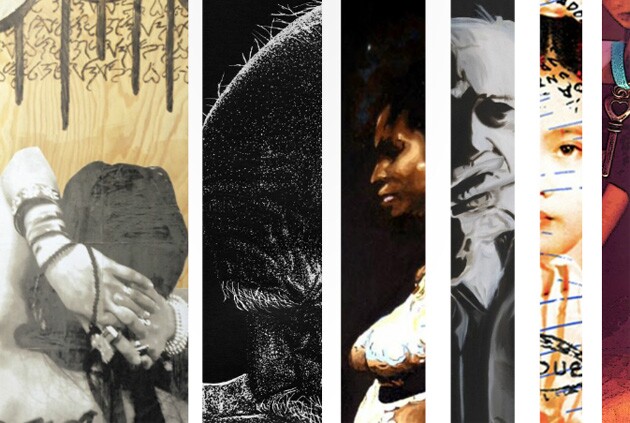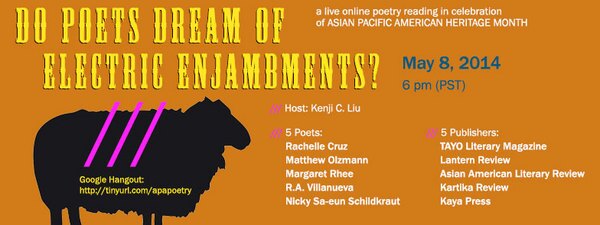Two Events for Asian Pacific American Heritage Month

Last year for Asian Pacific American Heritage Month I profiled pioneering Asian American poets from the first part of the 20th Century. This week L.A. Letters spotlights several contemporary Asian American poets by previewing two events on Asian American Poetry.
"Do Poets Dream of Electric Enjambments?" is a forthcoming online national poetry reading that feature five leading Asian American publishers and poets. The innovative reading is the brainchild of the poet, graphic designer and visual artist Kenji Liu. Liu served for several years as the Poetry Editor at Kartika Review, where he published dozens of writers from across the country. Launched in September 2007, Kartika is a national literary arts magazine that publishes Asian Pacific Islander American fiction, poetry, creative non-fiction, and art.
After growing up in New Jersey, Liu moved to Oakland where he fell into the city's literary community. His poetry chapbook "You Left Without Your Shoes" was nominated for a 2009 California Book Award. Currently in Riverside, CA, for an interim over the last two years, Liu has missed the direct contact with poetry in his daily life that he had in the Bay Area. For this reason he decided to host this online reading, with five poets and five publishers from around the country. He plans to "take advantage of free video chat technology to make this unique event as accessible as possible. Anyone with internet access will be able to view the event via YouTube, and if they're logged into Google Plus, they'll be able to interact with the poets."
The event brings together five Asian American publishers: Kartika Review, Lantern Review, TAYO Magazine, Kaya Press, and the Asian American Literary Review. Liu has personal connections with each. "Kartika Review and Lantern Review were two of the first lit journals to publish me," he says. "Together, these five represent some of the best literature on the west coast, east coast, and the Midwest." The reading takes place May 8 at 6 p.m. Pacific Time. Check the Facebook invite for more information.
Liu comments on the diversity and scope within the landscape of the Asian American poetry community. "The APA poetry community has its sub-communities, but on the whole, my experience is that we generally support each other," he says. "Many of the sub-communities reflect the same issues as any other literary community, such as preferences of taste, aesthetic, approach, politics, etc. Some reflect specific ethnic group networks that speak to how long our communities have been in the U.S., ranging from centuries to decades, and perhaps our varying access to education, arts, and other resources."
TAYO Magazine serves as an online and multimedia platform for storytelling, dedicated to the creation, cultivation, and promotion of Filipino/Filipino American arts. In addition to their online efforts, they also produce an annual print journal. They accept work regardless of ethnicity and nationality; more than anything they're "looking for pieces that slice into the phantasmagoria of the oppressed, marginalized, post-colonized, and diasporic life." One of their editors, Melissa Sipin, will be introducing the award winning Filipina Professor and poet Rachelle Cruz. Cruz is originally from the Bay Area and now teaches at UC Riverside. She hosts The Blood-Jet Writing Hour on Blog Talk Radio, and was an Emerging Voices Fellow, a Kundiman Fellow, and a VONA writer. Cruz will be reading her poetry during TAYO's section of the event.
Lantern Review publishes poetry "relevant to the Asian diaspora in North America, as well as work created collaboratively in a community context." Similar to TAYO, they welcome writers from all backgrounds as long as the work "has a vested interest" in the Asian American community. The editors "seek to publish expertly crafted poetry in a variety of forms and aesthetics, including traditional and experimental pieces, hybrid and multimedia projects, and new translations." The name was chosen because "Lanterns are cross-cultural symbols of aesthetic beauty, hope, festivity, and enlightenment. They have historically been a feature of community celebrations, and are also linked with exploration, discovery, and the forging of new paths." One of their editors, Iris Law, will be introducing the poet Matthew Olzmann. His first book of poems, "Mezzanines," was selected for the 2011 Kundiman Prize and was published by Alice James Books. He's currently a Visiting Professor of Creative Writing in the undergraduate writing program at Warren Wilson College.
The Asian American Literary Review is published biannually and features fiction, poetry, creative nonfiction, translations, comic art, interviews, and book reviews. The editors write: "The Asian American Literary Review is a space for writers who consider the designation 'Asian American' a fruitful starting point for artistic vision and community. In showcasing the work of established and emerging writers, the journal aims to incubate dialogues and, just as importantly, open those dialogues to regional, national, and international audiences of all constituencies." The poet Margaret Rhee will be presenting her work during their segment. Rhee is the author of the chapbook "Yellow" (Tinfish Press) and co-editor of "Here is a Pen: An Anthology of West Coast Kundiman Poets" (Achitote Press). Rhee was recognized as one of Hyphen Magazine's ten next generation Asian American poets and writers in 2012. She is currently a doctoral candidate at UC Berkeley and a Kundiman Fellow.
Kaya Press is one of the other presenters in this event and they will be represented by the poet, scholar and Professor Nicky Sa-eun Schildkraut. Both Kaya and Schildkraut have been featured in this column before. Kaya, a pioneering Asian American Publisher, recently celebrated its 20th anniversary. Schildkraut's work muses on the Korean American experience, and her first book of poetry, "Magnetic Refrain," was published by Kaya in February 2013. She is currently completing a book of lyrical and narrative poems, "Until Qualified For Pearl," and a non-fiction critical book about adoption narratives in literature and film.
Kartika Review will not only be represented by Kenji Liu, they will also spotlight the poetry of R.A. Villanueva. Villanueva is the author of Reliquaria, winner of the 2013 Prairie Schooner Book Prize, and is also a founding editor of Tongue: A Journal of Writing & Art. His writing has appeared widely in journals and anthologies, including AGNI, The Common, DIAGRAM, McSweeney's Internet Tendency, and Virginia Quarterly Review. He lives in Brooklyn.

Liu hopes to not only spotlight these important voices, he hopes to further promote and publicize the ever-growing field of Asian American Poetry. The timing is right, for more than one reason. Beyond Asian Pacific American Heritage Month, there is an increasing demand for more diverse literature to accurately represent our polyethnic nation. One of the most popular trending topics on Twitter over the last week has been, "We need more diverse books."
Furthermore, Pulitzer Prize winner Junot Diaz just wrote an essay about how his experience in grad school did not meet his needs as a writer of color. In an essay titled "MFA vs. POC," Diaz incredulously describes his grad school experience: "In my workshop there was an almost lunatical belief that race was no longer a major social force (it's class!). In my workshop we never explored our racial identities or how they impacted our writing -- at all. Never got any kind of instruction in that area -- at all." Diaz is not alone in his frustration with MFA programs for not being culturally sensitive or able to meet the needs of writers of color. For this reason one of the first things Diaz did once he became established was to help start a workshop for writers of color, called The Voices of Our Nation Workshop (VONA).
Another program similar to VONA is Kundiman. Several of the writers mentioned above were Kundiman Fellows. Kundiman is similar to the widely respected literary organization, Cave Canem, but rather than promoting African-American poets, it is focused on nurturing and supporting Asian American poets. Founded in 2004, and based in New York City, Kundiman "sees poetry not only as vehicle for cultural expression but also as an instrument for political dialogue and self-empowerment." They have had a number of award-winning writers in their program and their popularity continues to grow.
Finally, the 22nd Annual Chinese Poetry Recitation Contest is taking place at Cal State L.A. on May 6, from 1:30 to 4:00 p.m. at the University Student Union room 106. Sponsored by the Chinese Studies Department on campus, the event will be led by Dr. Jun Liu, the Director of the Chinese Studies Center at CSULA. In addition to his work in Chinese Studies, Liu is an award-winning English Professor and famous in both America and China for his writing and scholarship. In the 1980s he briefly served as a translator for the United Nations. Most recently he translated the celebrated Chinese writer Mu Xin's book, "An Empty Room," for New Direction Publishing. Liu has done more work than most bridging literature between the East and West. He is planning many more cross-cultural events between the Chinese Studies and English Departments, and poetry promises to be at the center.
There are obviously many more Asian American poets, publishers and events to cover. Next week will discuss several books by contemporary Asian American poets. The aforementioned publishers and poets are dedicated to Asian American poetry and adding diversity to the literary scene. Salute to Kenji Liu for bringing these poets together, and also to the participating poets and publishers. Together these titans are expanding the landscape of not just Asian American poetry, but the worldwide literary scene. And as Junot Diaz reminded us in his essay, and hundreds of thousands of people on Twitter tweeted, we need more diverse voices. Here's to these progressive voices pushing the envelope in the topography of both international and L.A. Letters.